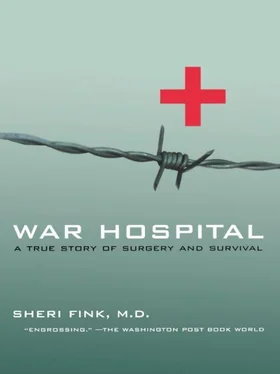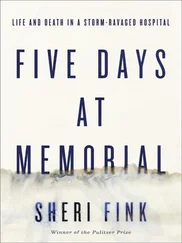—
JAMA (The Journal of the American Medical Association)
“ Wartime duty and medical ethics are stretched to the breaking point in this wrenching account… of a small group of brave and idealistic doctors who set up shop in the besieged Bosnian town of Srebrenica.”
—
Discover Magazine
“Unusually impressive documentation and stylistic superiority.”
—Library Journal
“Dr. Fink has taken on a mighty task here… She executes it with an artist’s ear and a journalist’s quiet authority. In the process, it’s possible that she’s delivered one of the most memorable chronicles of the Balkan conflict.”
—
American Book Review
“Just as a life-or-death difference in ordinary existence may be made by a medical professional, so a life-or-death difference has been made, in some of the recently-devastated places of the earth, by medical volunteers. Sheri Fink’s work repays some of the debt that is owed to them. It also makes a direct and vital connection between Hippocratic idealism and the wider struggle, which is against the gangrene of ethnic and religious fascism. A powerful read.”
— Christopher Hitchens
“A moving account of one of Europe’s worst modern tragedies. This heroic story of a small group of seemingly doomed doctors skillfully raises questions about medical ethics, international aid, and human nature itself. Humanity captured at its worst and its best.”
— David Rohde, Pulitzer Prize-winning journalist and author of
Endgame: The Betrayal and Fall of Srebrenica
“Sheri Fink, a doctor herself and someone with profound experience of practicing battlefield medicine, has a remarkable insight into this tragic and complicated story. Her book is an invaluable contribution to understanding what happened in Bosnia, above all in doomed Srebrenica, as well as a fascinating account of what it is to try to uphold (or fail to uphold) one’s medical oath in the midst of a genocide.”
— David Rieff, author of
A Bed for the Night: Humanitarianism in Crisis
“Sheri Fink’s book, which you won’t put down until the last line, is tough and unforgettable…. [It] is a lesson in courage.”
— Dr. Bernard Kouchner, founder of Doctors Without Borders, the recipient of the 1999 Nobel Peace Prize
“This is an important, gripping book about doctors in wartime… Like a special episode of ER , but with our cast operating in a very real dilapidated hospital without adequate equipment or supplies, War Hospital makes you care about Bosnians, makes you feel, see, and smell the fear, despair, humor, bravery, betrayal, and confusion that permeate war… Go get War Hospital and read it now.”
—Robert K. Musil, Executive Director of Physicians for Social Responsibility
“Sheri Fink, a physician with the ears of a reporter and the touch of a novelist, tells the unshakable story of ill-prepared medical volunteers in genocidal Bosnia with sensitivity and grace. She has given us a book about heroism, principle, compromise, triumph, and failure that respects them all.”
—David Hajdu, PEN American Award Citation
Afghanistan
humanitarian-military cooperation in
neutral aid worker targeting in
“Agreement for the demilitarization of Srebrenica” (April 17, 1993), Bosnian war ceasefire from
Ahmetović, Sadik
Boro Lazić and
postwar years of
self-injury of
Srebrenica evacuation and
Srebrenica Hospital and
Žepa evacuation and
Air Defense System
Airdrops. See also Operation Provide Comfort; Operation Provide Promise
Akashi, Special Representative of the U.N. Secretary-General Yasushik
Albright, Madeleine, Serbian atrocities and
Alić, Denis
Alić, Dr. Ejub
atheism of
Denis (Deno), son of
early career of
education of
family of
father’s death of
lack of surgical experience of
leg amputation by
literature, poetry and song of
Mubina, wife of
postwar years of
Srebrenica escape of
Srebrenica Hospital and
Tuzla Hospital and
war attitudes of
war’s effect on
youth of
Alić, Mubina
Ejub Alić and
mother’s death of
Alići
Amputations
priority of
war difficulties in performing
Amputees, major causes of death of
Anesthesia. See also Ketamine
history of
unavailability in Bosnia of
Annan, Kofi
as head of U.N. Department of Peacekeeping Operations
as U.N. Secretary-General
Wahlgren, Morillon and
Anterior tibial artery
APC (armored personnel carrier)
Apparatchiks, Communist-style
Arkan. See RaŽnjatović, Željko (Arkan)
Article 51 of U.N. charter
Association of Victims’ Families
Atrocities, war
in Bosnia
in Croatia
Atropine
Austro-Hungarian Empire
Avdić, Ajka
Bakalović, Dr. Avdo
Baljkovica forest
Balkans
Bečirović, Ramiz
Dutchbat and
Srebrenica evacuation and
as Srebrenica’s acting commander
Begić, Dževad
Begić, Sabit
Belgium
Belgrade
description of
U.N. refugee mission in
UNPROFOR in
Biafrans
Bijeljina
Bio-131-S
Birth control
Birtley, Tony (ABC news)
Bjelovac, battle of
Bojna hill
Bosanski Brod
Bosnia and Herzegovina. See also Bosnian Muslims; Bosnian war; Sarajevo; Srebrenica
annexation from Yugoslavia of
entry into U.N. by
government loyalists of
history of
hunger strike of
interethnic tensions in (1990)
medical supplies shortage in
military disadvantages of
Milošević’s economic blockade of (1991)
Muslim-Croat Federation of
Operation Provide Promise and
peace protests in
Serb land takeover of
Serb Republic of
Serb sanctions and
starvation in
U.N. and
U.N. arms embargo of
U.N. evacuations of
United States and
Bosnia international stabilization force
Bosnia radio
Bosnia-Herzegovina. See Bosnia and Herzegovina
Bosnian Army Second Corps
wartime health service reinvention of
Bosnian Army’s Twenty-Eighth Division
Bosnian government forces. See also Bosnian Muslim ad hoc troops; Srebrenican forces
Croatian forces teamed with
Serb attacks of
Srebrenica aid/arms smuggling of
Srebrenican evacuees and
Srebrenican forces and
Bosnian Muslim ad hoc troops
Serb nationalist forces v.
Bosnian Muslim nationalists
Bosnian Muslims
Croats v.
genocide of
mass graves of
oppression of
retributions on Serbs by
Serb ethnic cleansing of
Bosnian Serbs. See Serbs, Bosnian
Bosnian war. See also Bosnian government forces; Milošević, Slobodan; Serb nationalist forces, Bosnian; Srebrenican forces
1995 end of
beginnings of
ceasefire (April 17, 1993)
citizens involvement in
communication problems in
international reluctance to intercede in
Sarajevo and
Boutros-Ghali, U.N. Secretary-General Boutros
Bosnian concerns of
Bratstvo-Jedinstvo (For Brotherhood and Unity)
Bratunac
Srebrenican prisoners in
Bratunac health clinic
Srebrenican atrocity claims of
Brauman, Rony
Bosnian military intervention request of
MSF-France and
Britain
Afghanistan and
Bosnian war combat reluctance of
Contact Group peace proposal and
genocide prevention failure of
Broz, Josip. See Tito
Brussels
Budak mountain
Читать дальше












